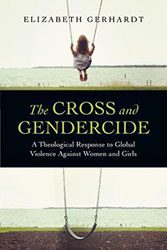 In her new book, The Cross and Gendercide: A Theological Response to Global Violence Against Women and Girls, theology and social ethics professor Elizabeth Gerhardt makes a case that violence and sexual assault against women is heresy. In her groundbreaking study, Gerhardt proposes a holistic theology of the cross as the basis for a prophetic response by the church to a problem that is not only moral and ethical, but also confessional.
In her new book, The Cross and Gendercide: A Theological Response to Global Violence Against Women and Girls, theology and social ethics professor Elizabeth Gerhardt makes a case that violence and sexual assault against women is heresy. In her groundbreaking study, Gerhardt proposes a holistic theology of the cross as the basis for a prophetic response by the church to a problem that is not only moral and ethical, but also confessional.
Here, Dr. Gerhardt responds to a few questions about her important book.
What made you want to research the topic of gendercide to write this book?
 I have worked with victims of domestic and sexual violence for over twenty-five years in different capacities: shelter director, clinical counselor and educator. In addition, through research and networking I developed an interest in global violence against women and the common roots of violence that exist both in domestic abuse in the United States and gender violence around the world.
I have worked with victims of domestic and sexual violence for over twenty-five years in different capacities: shelter director, clinical counselor and educator. In addition, through research and networking I developed an interest in global violence against women and the common roots of violence that exist both in domestic abuse in the United States and gender violence around the world.
How does your experience working with victims of violence here in the U.S. relate to global gendercide issues?
Years of working with abused women has led me to a deeper understanding of the systemic causes of violence against women and girls. These underlying causes of violence, patriarchy, domination and objectification of girls and women are the same for domestic violence in the home, exploitation of women and girls in sweatshops across the world, gender-selective abortions, female infanticide, widespread rape during war, female genital mutilation and many other types of horrific gender-related violent crimes. Currently, there are many good reading resources that focus on education, counseling and self-help in the area of domestic violence. However, it is important for the church to develop a holistic
and theologically based response to global violence against women that addresses the underlying economic, cultural, religious and political causes of violence against women and girls.
Why did you want to write a book that integrated theology with the global struggle of violence against women?
I was interested in not only providing a global perspective but also a theological paradigm that would enable the church to view this problem as a confessional issue that needs broader and deeper solutions. I thought that my background in the areas of counseling, theology, social justice and research in global studies would provide a unique perspective for addressing violence against women and girls. . . .
A theology of the cross offers a useful approach and methodology by providing a perspective that roots social ethics in faith and a correction to the misuse of the Christian tradition. From this viewpoint, global violence against women and girls is defined in both legal and spiritual language and challenges the church to engage in both realms. A theology of the cross provides the foundation for the church to be a prophetic voice that counters violence.
What do you want The Cross and Gendercide to accomplish within the church?
The purpose of this book is to educate church leaders, scholars and lay persons on the global issue of abused women and girls, the subsequent complexity of this problem and the need for a theologically based response. It is vital that the Christian church gain an understanding of violence against women and girls as a particularly heinous type of violence that is related to other global social concerns such as poverty, the international AIDS crisis and the proliferation of orphaned children in undeveloped countries. . . .
The major unique contribution of the book is to challenge the church to engage in a paradigm shift in addressing the problem of global violence against women and girls, and related social issues. Luther’s theology of the cross and Dietrich Bonhoeffer’s ethics and activism provide a framework for addressing the church’s prophetic role in the work to end violence against women and girls. This book proposes a cohesive church response to the problem of global violence as a confessional issue, not merely an ethical and moral issue.
To read an excerpt — and for more conversation — from The Cross and Gendercide, visit the Patheos Book Club here.













